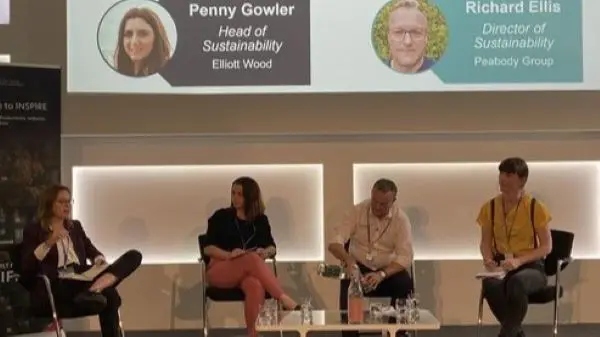UCEM INSPIRE: ensuring long-term sustainability performance in the built environment
Posted on: 4 October, 2023

This article is the third in our series of posts covering our second INSPIRE event this summer. Read our previous piece on built environment sustainability targets – UCEM INSPIRE: experts define built environment sustainability leadership.
In line with the ‘Who We Influence’ strand of its Sustainability Strategy 2023, UCEM recently held the second of its ‘INSPIRE’ events focused on the need for effective leadership in the quest for a more sustainable built environment.
UCEM’s ‘INSPIRE’ events are themed sessions that enable collaboration between influential stakeholders to consider the various challenges facing the industry, bringing together INfluence for Skills, Productivity, Industry, Research and Education.
The event was supported by the Construction Industry Council (CIC) and the Construction Leadership Council (CLC). It was run in partnership with the Edge, a built environment think-tank.
This in-person event brought together sustainability leaders and experts from leading organisations in the built and natural environment sector, including property owners, developers, designers, consultants, contractors and managers.
This article highlights some key topics from one of the event’s panels, called ‘Achieving & Managing Performance’, which underscored the urgent need for cohesive strategies and shared visions if built environment sustainability leaders are to ensure their organisations maintain their sustainability performance over the longer term.
The Panel comprised:
- Sara Edmonds, Head Of Citizen Engagement, Built Environment – Smarter Transformation [Chair]
- Jessica Broomhall, Sustainability & ESG, Intermediate Capital Group
- Richard Ellis, Director of Sustainability, Peabody Group
- Penny Gowler, Head of Sustainability, Elliott Wood Partnership
The critical need for cultural change
The panel discussion began by addressing an important question: how can built environment sustainability leaders guide genuine cultural shifts within organisations to ensure sustainability performance is something adhered to over the long term?
Sustainability, as the panel highlighted, is not a standalone issue. It intersects with finance, operations, human resources and many other facets of organisations’ activity. Bridging these gaps is essential to ensure that sustainability is not relegated to a corner but is integrated into the broader business strategy.
Jessica Broomhall, who had encountered this issue during her work in the finance sector, kicked off the conversation, accentuating the undeniable role of effective communication. In her view, one of the most significant challenges lies in demystifying intricate sustainability concepts. To bring about a transformative change, it is not about making everyone in an organisation an environmental expert. Instead, it is about translating these vital initiatives into a language relatable to those in the finance and asset management sectors, ‘adding value’ to real estate portfolios by improving their energy performance or by making loans contingent upon projects meeting long term sustainability performance criteria.
Penny Gowler, echoing a theme that was mentioned by many different contributors throughout the INSPIRE event, thought that a clearly defined purpose can truly galvanise an organisation. The Elliot Wood Partnership’s guiding light, ‘to engineer a better society‘, is not just a fancy tagline. Instead, it has influenced every operational decision and, more importantly, it has become a compelling reason for people to join and continue working for the practice.
Richard Ellis brought another dimension to the table, championing the power of human-centric narratives. Data and figures are undoubtedly crucial in spurring organisations to achieve their sustainability goals initially. However, once the novelty of achieving the target had worn off, then stories, especially those relating how sustainability improvements would better the lives of people, in Richard’s case the lives of the Peabody’s Group’s residents, were vital in inspiring those in an organisation to maintain higher levels of environmental sustainability.
Competition and collaboration: Two sides of the same coin?
The panel discussion began by addressing an important question: how can built environment sustainability leaders guide genuine cultural shifts within organisations to ensure sustainability performance is something adhered to over the long term?
Sustainability, as the panel highlighted, is not a standalone issue. It intersects with finance, operations, human resources and many other facets of organisations’ activity. Bridging these gaps is essential to ensure that sustainability is not relegated to a corner but is integrated into the broader business strategy.
Jessica Broomhall, who had encountered this issue during her work in the finance sector, kicked off the conversation, accentuating the undeniable role of effective communication. In her view, one of the most significant challenges lies in demystifying intricate sustainability concepts. To bring about a transformative change, it is not about making everyone in an organisation an environmental expert. Instead, it is about translating these vital initiatives into a language relatable to those in the finance and asset management sectors, ‘adding value’ to real estate portfolios by improving their energy performance or by making loans contingent upon projects meeting long term sustainability performance criteria.
Penny Gowler, echoing a theme that was mentioned by many different contributors throughout the INSPIRE event, thought that a clearly defined purpose can truly galvanise an organisation. The Elliot Wood Partnership’s guiding light, ‘to engineer a better society‘, is not just a fancy tagline. Instead, it has influenced every operational decision and, more importantly, it has become a compelling reason for people to join and continue working for the practice.
Richard Ellis brought another dimension to the table, championing the power of human-centric narratives. Data and figures are undoubtedly crucial in spurring organisations to achieve their sustainability goals initially. However, once the novelty of achieving the target had worn off, then stories, especially those relating how sustainability improvements would better the lives of people, in Richard’s case the lives of the Peabody’s Group’s residents, were vital in inspiring those in an organisation to maintain higher levels of environmental sustainability.

Penny certainly welcomed collaboration, but thought, in many ways, too much was happening in the sector, resulting in fragmentation, with numerous overlapping groups and initiatives trying to achieve the same goals. She hoped that overarching standards, like the Net Zero Carbon Building Standard, would not only prevent duplicated efforts but also strengthen the push towards shared sustainability objectives.
Richard Ellis touched on an oft-ignored aspect of collaboration – the inherent risks. For genuine co-working, there must be equitable risk-sharing, which often did not occur. New technologies or working practices could improve the long term sustainability of buildings, but if they did not work or even caused side-effects then clients were either stuck with the resulting issue for the lifetime of the building or faced with expensive replacement costs. This meant that clients or estate owners were often quite risk-averse when it came to looking at means to improve the environmental performance of their portfolios.
Penny certainly welcomed collaboration, but thought, in many ways, too much was happening in the sector, resulting in fragmentation, with numerous overlapping groups and initiatives trying to achieve the same goals. She hoped that overarching standards, like the Net Zero Carbon Building Standard, would not only prevent duplicated efforts but also strengthen the push towards shared sustainability objectives.
Richard Ellis touched on an oft-ignored aspect of collaboration – the inherent risks. For genuine co-working, there must be equitable risk-sharing, which often did not occur. New technologies or working practices could improve the long term sustainability of buildings, but if they did not work or even caused side-effects then clients were either stuck with the resulting issue for the lifetime of the building or faced with expensive replacement costs. This meant that clients or estate owners were often quite risk-averse when it came to looking at means to improve the environmental performance of their portfolios.
Maintaining sustainability performance
The panel were also asked to reflect on what they thought was the single most important factor that influenced, or change that could be made to, the sustainability performance of the built environment.
Penny thought that there needed to be more comprehensive information about the environmental performance of the existing building stock to enable the most efficient targeting of retrofitting efforts.
Similarly, Richard implored all of those working in the built environment to think about the operational performance of structures over decades, not just at construction.
Continuing her earlier thoughts about the correlation between sustainability’s relevancy to individuals and their interest in it, Jessica suggested giving people the opportunity to interact with the natural environment more frequently. especially if this could be incorporated directly into the built environment.
Conclusion: Forging a sustainable future
The insights offered during the panel discussion elucidated the multifaceted nature of sustainability in the built environment. The clear message was that cultural change within organisations is not just about implementing isolated sustainability measures but about integrating sustainability holistically across different sectors and aspects of the built environment, via effective communication and cross sector collaboration.
At UCEM, we champion these values and remain committed to fostering an environment where sustainability is not an afterthought but the very core of our initiatives and strategies.
Read more about the INSPIRE event’s other panels, ‘Defining Sustainability Leadership’ and ‘Accepting The Challenge – Setting Targets’





